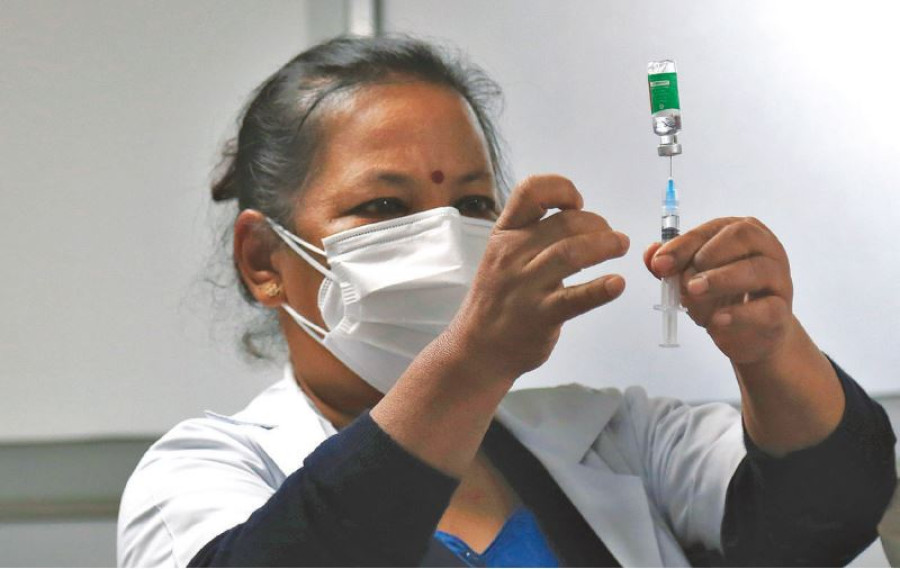Health
When will people get booster shots?
There are no vaccine doses to administer booster shots to the general population. Officials had said boosters will be started once 40 percent of the population is inoculated.
Arjun Poudel
When public health experts, epidemiologists and virologists stressed the need for booster shots of the Covid-19 vaccine before the third wave hit the country, officials at the Ministry of Health and Population had said that boosters will be started once 40 percent of the total population is inoculated.
And as of Monday, 14,204,270 people have been immunised against Covid-19, which is 46.8 percent of the 30,378,055 population.
However, Nepal’s total population has been confirmed to be 29,192,480, according to the preliminary figures of the 2021 census released by the Central Bureau of Statistics.
Going by the new numbers, around two percent more or 48.65 percent of the total population has been immunised, but the government has not taken any decision on booster shots for the general population.
“Some countries have already started fourth doses and several countries have started booster shots,” Dr Biraj Karmacharya, an epidemiologist, told the Post. “We don’t know when the authorities will start booster shots for the ordinary people.”
The Health Ministry started booster shots for frontline workers—doctors, nurses, paramedics, lab technicians, hospital staff, female community health volunteers and ambulance drivers from January 16.
Journalists, bureaucrats, lawmakers; those serving in diplomatic missions and financial institutions; prisoners, people living in old-age homes and refugees, who were vaccinated in the first phase of the immunistion campaign starting January 27 last year, are being administered booster shots.
People above 60, who were jabbed with the Vero Cell vaccine, are also being provided with booster shots.
Experts say Omicron, a highly contagious variant of the coronavirus, is neither the latest nor the last variant, which has wreaked havoc throughout the globe. Even after the Omicron variant spread around the world, new Omicron variant BA.2 is spreading in many countries including Nepal.
The BA.2 is possibly a bit more contagious than the first Omicron variant called Omicron “BA.1”.
“The BA.2 has already become dominant in Nepal,” Dr Prabhat Adhikari, an infectious disease and critical care expert, told the Post. “Omicron positive in S-gene positive swab samples means it is Omicron BA.2.”
A whole-genome sequencing carried out by the National Public Health laboratory a few days ago showed that out of 32 swab samples of infected people, 28 tested positive for the Omicron variant.
The study shows that the Omicron variant has been clearly displacing the Delta variant, which caused devastation in the second wave of the pandemic in the country.
The laboratory tested the swab samples of the infected people, whose S-gene targets were found positive. Earlier, the laboratory had only carried out whole-genome sequencing in swab samples of infected people with S-gene dropout, one of the proxy indicators of Omicron.
According to doctors, swab samples in which the S-gene targets are missing are considered to be infected with the Omicron variant. Laboratories use samples with S-gene missing for whole-genome sequencing to determine the presence of the said variant. And confirmation of the Omicron variant in the S-gene positive samples means infection is caused by the BA.2 variant.
Doctors say virus variants may not be mild like Omicron every time and the apathy for launching booster shots may have serious consequences.
“The government’s apathy in times like these would have resulted in a large number of deaths if the dominant virus variant was fatal like Delta,” Dr Keshab Deuba, a public health epidemiologist, told the Post. “This time the virus variant turns out to be mild and the infection does not get serious on many people due to vaccination.”
Experts say immunisation against the contagious virus is not an expenditure but investment, which saves lives and money and keeps the economy afloat.
Meanwhile, officials at the Ministry of Health and Population said that no decision has been made so far about booster shots against Covid-19.
“I don’t know when the booster shots will start,” Dr Roshan Pokhrel, secretary for the Ministry of Health and Population, told the Post. “We do not have the vaccine to give as booster shots to the general population. If the National Immunisation Advisiory Committee recommends one, the government will start preparations accordingly.”
On Monday, 5,292 people tested positive for the coronavirus—3,472 in 10,368 polymerase chain reaction tests and 1,820 in 5,720 antigen tests. In the last 24 hours, eight people died due to complications related to coronavirus infection.
Active cases across the country stand at 79,272.




 12.28°C Kathmandu
12.28°C Kathmandu















